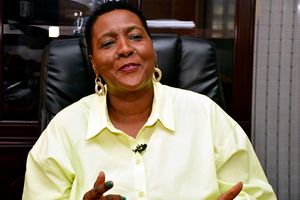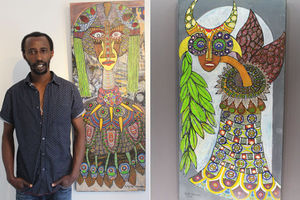
Sara Mueller-Issa Okello (left) and Dorcas Mbugua who have returned to Kenya after years of building lives abroad.
Every year, thousands of Kenyans leave the country in search of better opportunities in the diaspora. Many are looking for further education or greener pastures. While life abroad often promises greater stability, exposure, and success, it also comes with its own set of challenges — including culture shock, homesickness, and the emotional pull of the motherland. For some, after years of building lives in foreign lands, they decide to return home. Is life overseas blissful? NationLifestyle spoke to two Kenyans who went, saw, conquered life abroad — and came back.
Dorcas Mbugua on life in Australia

Dorcas Mbugua, a lawyer and journalist at her home in Nairobi. She has lived in Australia for 13 years.
When Dorcas Mbugua boarded a plane to Australia at 19, she believed she was heading to a land of endless opportunity. Fresh out of high school in Nairobi, her parents sent her to the University of Adelaide to pursue a double degree in law and media — a compromise that catered to both her creative dreams and her parents’ aspirations.
“I was more creatively inclined, so I wanted to be a journalist. I found a university that offered a double degree in law and media. It ticked off the media part for me and the law part for my parents,” she says.
For Dorcas, the move became much more than an academic pursuit. It turned into a 13-year journey of culture shock, loneliness, resilience, and, eventually, a return to her roots. She came back to Kenya in 2020.
Upon landing in Adelaide, Dorcas experienced immediate culture shock.
“There was no traffic — in fact, the roads were empty,” Dorcas recalls. “The drive from the airport to my accommodation was so quick, only 15 minutes, that it confused me. Even the streets felt deserted. What shocked me was that there was nobody in sight,” the 37-year-old says, adding that she was also stunned by the cleanliness of the city.
“There was no dust. The road was perfectly clean. There wasn’t a pothole in sight — not even a blemish.”
Though her mother stayed with her for two weeks to ease the transition, Dorcas struggled deeply after she left.
“When mom left, I wept. I had never been by myself my whole life. Back in Kenya, I’d wake up, my parents would take us to school. On weekends, we’d either go to church or out for fun — we were always together. And then here I was, all alone in this strange country.”
“One thing we realised in those two weeks is that people in the West mind their own business — whereas Africans mind each other’s business.”
Within weeks, Dorcas felt isolated.
“I didn’t want to stay. I had never experienced that kind of loneliness. I couldn’t even understand my lecturer’s accent for the first few weeks,” she recalls.
Despite the hardships, Dorcas pressed on with her education, navigating everything from social dynamics to explaining her Kenyan identity to those who knew little about Africa.
“That’s the first time I knew I was Black. I was the only Black person in my class. I’d constantly get questions like, ‘How do you know English? When did you start speaking English? When did you start wearing clothes?’” she says.
To sustain herself in Adelaide, Dorcas worked part-time jobs in housekeeping, bartending, and waitressing.
“Housekeepers are the people who come to clean your hotel room. In Kenya, that’s not seen as glamorous and doesn’t pay well, but in Australia, it pays very well. I was making $25 (Sh3,231) an hour.”
“I remember telling my parents I’d gotten a job as a cleaner, and they couldn’t understand. I felt ashamed to tell people back home what I did — but on the ground in Australia, it was good money. It was flexible and fit my student schedule.”
Identity crisis
When Dorcas returned to Kenya for the first time after a year and a half abroad, she felt alienated from the very home she had missed.
“I started feeling anxious. I hadn’t seen traffic in so long,” she says.
Reverse culture shock hit hard.
“I ended up in tears. I remember walking through town — people bumped into me and didn’t say sorry. The crowds, the spontaneous visits from relatives, and the general chaos were too much after the orderliness of Australia. I had an identity crisis. I was like, who am I?”
Returning to Australia didn’t help.
“Now again, I was back to loneliness, back to spelling my name, and back to being Black.”
Dorcas sank into depression, battling homesickness, cultural tension, and academic pressure.
“I wanted to go home, then felt guilty and ungrateful. My parents were paying so much money. People would kill for this opportunity. How dare I complain? Why am I not enjoying it? I started failing in school. I nearly got deported.”
“Friends and relatives back home encouraged me to keep going — I had already started the journey.”
Coming back to Kenya
After completing her seven-year degree, Dorcas did a diploma in legal practice to qualify as a lawyer in Australia. She then began working as both a lawyer and writer.
Despite building a thriving career, she always knew she wanted to return.
“I always knew I wanted to come back. But I had to be strategic. First, I had to secure Australian citizenship, which I got as a skilled migrant.”
In early 2020, just before the Covid-19 pandemic, Dorcas left Australia.
“I had planned to travel the world before settling down in Kenya. But as fate would have it, the world shut down — and I found myself back home for good.”
Today, she lives in Kenya with her husband, whom she met in Australia, and their two children. She works as a recruiter of East African students for an Australian university.
“The freedom, flexibility, and support with childcare in Kenya are incomparable. If we were in Australia, one of us would have to stay home with the children — or we’d be paying $200 (Sh25,860) a day for daycare.”
“My lifestyle in Australia was more free — especially around self-expression. But Australia’s systems were more efficient. You’re paid on time. Pay is transparent.”
Re-adjusting to Kenya was challenging.
“I tell my friends who want to return: you need a therapist to meet you at the airport. The lack of timekeeping, dishonesty, and bureaucracy were painful reintroductions. Slowly, I began to unravel — and then, accept.”
Her advice to those moving abroad?
“Don’t romanticise anything. Be informed. Make friends who don’t look or sound like you. We tend to stick with other Kenyans, which is comforting, but they face the same limitations. Make friends outside your bubble — you’ll get a window into another world.”
Sara Mueller-Issa Okello: “In Switzerland, systems work”

Sara Mueller-Issa Okello, is the founder of a Community-Based Organisation called MatsaRigi in Kilifi. She has lived in Switzerland for 21 years.
When Sara Mueller-Issa Okello lost her job as a manager at United Touring Company (UTC) in 2002, she took a three-week trip to Switzerland to visit a friend. That short trip turned into 21 years of working as a caregiver.
Sara had worked with UTC for 21 years and was 42 years old when she moved.
“Moving to Switzerland wasn’t something I planned. But I had the Swiss passport, which made it easier.”
Though she had visited Switzerland many times before, settling permanently was a different experience.
“Going on holiday and living permanently are two different things. The culture shock was profound. In Kenya, people are free — we laugh loudly, we talk freely. The Swiss are very conservative. Some might even call them boring — but that’s their culture.”
Food was another adjustment.
“We’re used to sukumawiki and ugali. There was nothing like that in Switzerland.”
Sara initially intended to stay for five years.
“But being apart from my children was too hard. I realised I would miss the most formative parts of their lives. So after a year, I brought them to live with me.”
She stayed in Switzerland for the sake of her children’s future.
“I always told them: ‘I’m here because I want to see you stable. Once you are, I’ll return home.’”
In 2023, after her last-born son finished his studies and began working, Sara finally returned to Kenya.
“Frankly speaking, my body was in Switzerland, but my heart and spirit were here. Kenya is my motherland — despite its flaws.”
Life after returning
Today, Sara lives in Kilifi County and runs a community-based organisation called MatsaRigi.
“We focus on education, healthcare, sustainable farming, and empowering women and youth.”
She keeps busy with farming and the organisation.
“Sometimes I ask myself, ‘Am I really retired?’ Between running the CBO and farming, my days are always full.”
At home, she grows coconut trees, mangoes, passion fruit, and bananas — and keeps chickens, ducks, and guinea fowls.
“Transitioning back was easy because I always wanted to come back. But I still struggle with things like timekeeping and transport. In Switzerland, it was easy to plan a day. Here, not so much.”
What does she miss about Switzerland?
“The bread — there’s always such a variety. And the systems. In Switzerland, things work. If you have a 10 am immigration appointment, it’s at 10am. Be 30 minutes late, and you need a new appointment.”







